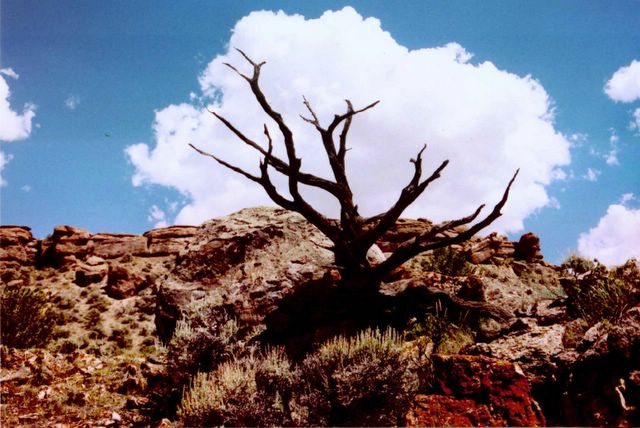I just don't believe that God, the God whom I know and love, would instruct humans to commit infanticide. See, I'm trying to concentrate on
1 Samuel 15: 34-16:13, where God guides Samuel to the house of Jesse to select a new king. On the way, God tells Samuel not to worry about physical appearances, (or family tree for that matter, since Jesse's lineage isn't that spectacular, including Canaanites, prostitutes, and others) because God sees what is on the inside of a person. That's how God will select David--by his inward character. (Yet, when David is selected, all the storyteller has to say about him is that he has beautiful eyes and is ruddy and handsome.) The text is rich and beautiful. It is a great beginning for what will be a great story about a king "after God's own heart," a lover and a fighter, a man with the tenderness to write some of the most beautiful poetry in the Bible, and with the brazenness to face a giant. It is
pre-
packaged in the
lectionary with the mustard seed parable for a great, inspiring sermon about God bringing forth great things from humble beginnings--and how we shouldn't judge
something's value by the exterior.
But, what keeps haunting me is the first half of chapter 15, when the reason is given for God's disapproval of the existing king, Saul. Unsurprisingly, the lectionary skips over this little detail to the story. Saul has other faults and foibles (as does David) but the thing that really gets him the pink slip is that God commands him to go and completely annihilate the Amalekites, including "man and woman, child and infant, ox and sheep, camel and donkey.’” Saul carries out the assignment, for the most part. He spares the king, whom he brings back with him as a captive, and he also spares some of the choice livestock, which he apparantly also intends to burn on the offering pyre. (Or at least that's what he tells Samuel after the fact) So, God decides he isn't worth spit anymore and instructs Samuel to go fetch David, "And God was sorry he had made Saul king over the Israelites."
This isn't the only time God commands his people to slaughter innocents in the scriptures, and it's not like I'd never run across this dilemma before, but it's just sticking with me today. My usual way around this is to attribute these kinds of scriptures to the author's interpretation that God's will is being carried out in the violence, and so the author of the scripture puts the "command" in God's mouth, attributing something to God something that makes sense at the time, but seems utterly repulsive now. This is really the only way I can square some of the violent aspects of the Bible and remain a person who leads a faith community. So, obviously I'm not a biblical literalist. Perhaps it is more appropriate to call me a biblical denialist. I deny this scripture. I don't deny it is there. I'm sorry it is part of scripture. I shake my fist at it. I just don't think it is an accurate revelation of God. I see no redeeming quality to God ordering the massacre of infants. There's nothing that can make it "okay." I realize this may be an easy way out, but it is the only way I see fit to keep the faith and uphold a set of principles that are humane. I hate that it is even there for me to have to wrestle with. Why muddy the waters, God? Thou shalt not kill? Well, perhaps this is just one more reason against bibliolotry. But in this part of the country, it seems like questioning scripture is tantamount to denying God's existence. On the contrary, I think questioning this scripture is tantamount to advocating God's existence.
(I've had to take several brakes from this post over the evening, so I've lost some of the initial fire and angst that prompted it: I watched a stupid movie with Wesley and Lara, Bee Movie, man was that disjointed, I've gotten Wesley and Julianna to bed (Julianna took a good bit of time), and then there was a tornado warning just about 10 miles southwest of us (which moved south, fortunately) so, I don't want to seem flippant about something as heart wrenching as struggling with God and ethnic cleansing, but I've just lost a bit of gas on the issue.
One thing I really wrestle with is the intellectual honesty of subscribing to this "well if it makes my conscience want to throw up, it's probably not an authentic aspect of God, even if it is attributed to God in the scripture" kind of approach to scripture when the "official stance" I take as an ordained elder in the United Methodist Church is that scripture contains all things "necessary to salvation." Perhaps salvation sometimes comes in being willing to say to God, "this scripture really sucks and I really hope you're more than what is portrayed here, otherwise you're just some two-bit tribal god who's not worthy of worship or respect. So, God, explain to me why you'd allow people to either a: worship you with you issuing genocide, or b: write about you in this way and then guide a whole church to treat these stories as divinely inspired."

















